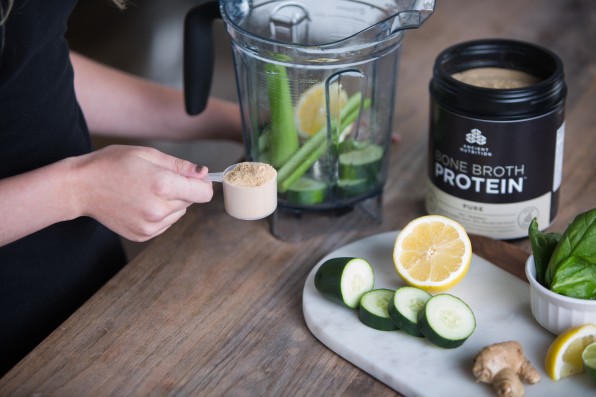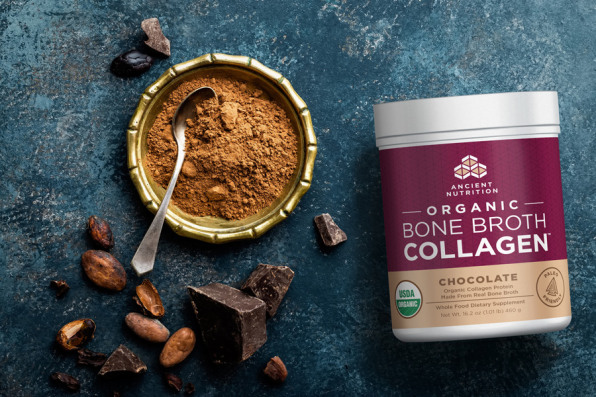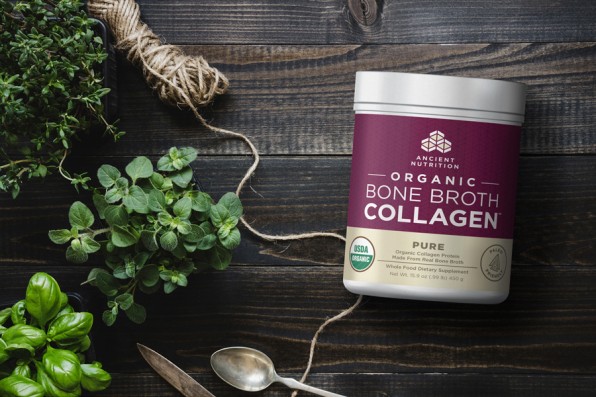How To Fix Bitter Bone Broth
Several years ago, Jordan Rubin found himself nursing an injured knee.
At the time, the entrepreneur was considering his next move after leading the billion-dollar dietary supplement company Garden of Life, which he founded in 2000 while battling Crohn's Disease. Rubin sold Garden of Life to Atrium Innovations in 2009 (it has since been acquired by Nestlé).
A diet book author and motivational speaker, he was accustomed to depending on whole foods and supplements to try to fix whatever troubled his body. But this time, he struggled: Rubin couldn't find any portable bone broth, considered the liquid gold of collagen.
He could have done what most do, which is spend hours making the amino acids-rich bone broth at home. But it's a lot of work: There's the shopping, the chopping, then the hours slaving over a simmering cauldron of meat bones. It can take anywhere from 12 to 48 hours.
His knee prevented him from long periods of standing. So instead he relied on a powdered bone broth concentrate that he peppered into drinks and meals. He even began traveling with it.
"It hit me like an epiphany," recalls Rubin, "I needed to create the very first bone broth protein company."

In 2016, he cofounded Ancient Nutrition to exclusively focus on bone broth protein and collagen supplements. "Ancient Nutrition was started not just by what was lacking in the marketplace, but what was also lacking in my diet," explains Rubin.
Bone broth was on the cusp of popular interest, with celebrities such as Gwyneth Paltrow and Kobe Bryant swearing by the broth's restorative and healing properties. Broth bars started popping up in cities like New York and Portland, Oregon. A 2015 New York Times piece even gave the consumption a trendy new name: "broth-ing."
Although Rubin previously succeeded in retail expansion, the idea of finding a mass audience for such a niche, obscure category eluded him. How could he make such a specific protein appeal to the average health enthusiast? He turned to someone who knew how to tap into the wellness community: Dr. Josh Axe.
Axe is more than just a physician, clinical nutritionist, and popular radio host–he is, ostensibly, the brand of supplement lovers. His website, DrAxe.com, is their Goop. There's lifestyle content, recipes, and of course, an entire shopping section. The digital content powerhouse receives over 17 million unique visitors per month and counts 2.7 million Facebook followers. And, like Rubin, Axe had long been a strong supporter of bone broth, which he often recommends for "cleanses" (i.e., intermittent fasting with bone broth) and calls it "the go-to superfood for bone health."

A Convergence Of Pop Culture And Age-Old Health Beliefs
In early 2017, a profitable marriage was brokered between the two supplement giants. The companies merged, and Axe came on as cofounder of Ancient Nutrition with the goal of taking bone broth to the mainstream.
"We wanted a relevant content and direct-to-consumer platform that spoke to the new generation, and that's what the Dr. Axe team brought," explains Rubin. Axe felt similarly about the product formulation and retail expansion end, noting "so many of Rubin's companies' strengths was our weakness."

Within a year, the duo crafted an entire line devoted to bone broth, claiming to aid one's gut, immune system, joints, lean muscle mass, metabolism, skin, hair and, nails. Protein powders boast a medley of wide-ranging flavors (French vanilla, coconut lime, turmeric, etc.), starting at $44.95 for a 17 oz. tub. Soon thereafter came pills, coffees, and protein bars. On the Ancient Nutrition website, you'll find recipes for smoothies, waffles, even roasted salmon with a scoop or Organic Bone Broth Protein™ Savory Herbs.
Ancient Nutrition has since become the No. 2 ranking protein supplement within the $37 billion U.S. supplement industry. In March, the company announced it received $103 million in funding from a group of over 100 investors, led by private equity firm VMG partners and Hillhouse Capital. Other investors include Jillian Michaels (host of NBC's The Biggest Loser), Justin Gold (founder of Justin's), John Foraker (former CEO of Annie's Homegrown), and Ido Leffler (cofounder of Brandless.com).
"It was just a perfect convergence of pop culture and something that took 5,000 years to become an overnight sensation," says Rubin. "We didn't invent bone broth. We just gave people a way to consume it every day, simply and effectively."
Axe reflects on a different era, just 15 years ago, when he led multiple health seminars. He would ask the crowd if they knew what omega-3 fatty acids were. Less than 10% raised their hands. "Today, everybody knows," explains Axe, noting the evolution of public knowledge. "We're starting to see the same thing today with collagen, a completely necessary thing that we're just not getting in our diet anymore."
Collagen is indeed the most abundant protein in the human body, composing 70% of human skin, hair, nails, and bone, and essential for strength and bone structure. Ancient Nutrition's products claim to harness more powerful doses of the protein that in its predecessor.
"Bone broth protein has more of everything that you want in bone broth than bone broth itself," says Rubin.

A Debatable Benefit
A traditional cup of bone broth contains six to 12 grams of protein per cup, but whether that actually firms skin or increases collagen has been subject to debate. In fact, a 2013 study published in Medical Hypotheses suggested that meat bones are slightly contaminated with toxic metals and therefore best avoided in large quantities.
Kate Scarlata, a Boston-based registered dietitian and gut health expert, points to a recent study that found promising collagen results in antioxidant capacity, anti-aging effects, enhanced wound healing, treating osteoporosis and osteoarthritis, and potentially reducing the risk of cardiovascular disease. The research, however, was limited to animals. "We can't always translate that to humans," says Scarlata. "We're just not there yet."
She also has reservations about supplements, noting that not all supplements seem to work the same in the body, likening it to probiotics, which vary from person to person.
"I always try to get the nutrients by food, because nature always seems to have it a little bit better than than we do," explains Scarlata. "Foods are encapsulated with fiber and phytochemicals and a number of other things that often work synergistically in the body."
The supplement delivery model has more than a few issues surrounding it. In 1994, Congress passed the Dietary Supplement Health and Education Act as a means to define and regulate dietary supplements. But it does not oversee efficacy, thereby leaving a low barrier of entry for anyone to enter the space and promise all kinds of benefits. The law permits companies to advertise "support" of health as long as there's no claim to prevent, cure, or reverse a condition.
And even if they do work, are they necessary? In a 2016 study titled "The Supplement Paradox: Negligible Benefits, Robust Consumption" published in the peer-reviewed Journal of the American Medical Association (JAMA), researchers found that while many supplements treat vitamin and mineral deficiencies, "for the majority of adults, supplements likely provide little, if any, benefit."
Ancient Nutrition's founders acknowledge the flaws inherent in the greater supplement industry. As Rubin states, "literally anyone in their underwear at home can start a [supplement] company, so I get that there's that mentality out there." In advocating for Ancient Nutrition's product quality, he notes the extensive testing and rigorous trials conducted by multiple nationwide retailers such as Whole Foods, which carry the line.
"There are routine FDA inspections," stresses Rubin. "There are rules."
The thousands of client testimonials and repeat customers could, in some ways, attest to the product line's efficacy. "I was experiencing crippling joint pain–knees, shoulders, elbows, ankles, hips. No more pain," writes one 64-year-old on Amazon. Another reviewer swears her once weak fingernails are now "much stronger and growing past the ends of fingertips" while her hair is "so much longer than in the past and not looking stringy and weird."

The Rise Of Alternative Channels To Self-Diagnose
Despite debated regulation, supplements remain a solid business. It's estimated that 68% of Americans take dietary supplements, with 84% of Americans expressing "overall confidence in the safety, quality, and effectiveness of dietary supplements," according to a 2015 survey by the Council for Responsible Nutrition. That number is expected to substantially grow in coming years as more consumers increasingly look to preventative medicine and a growing population attempt to ease ailments.
Another key trend pushing supplements to the forefront of the health industry is consumers relying on "alternative channels" to self-diagnose, reports McKinsey. Adults no longer depend on their doctor to prevent or treat issues–they're going online and attempting to handle it independently, with direct-to-consumer supplement companies serving as their corner pharmacy. Meanwhile, a new wave of companies–Goop, Ritual, Care/Of etc.–reposition supplements as a lifestyle brand.
Currently, 80% of of Ancient Nutrition's clientele is female, the majority ranging between the ages of 25-40. ("She shops at Whole foods and Lululemon, does yoga," says Rubin of the average customer). The company intends to add more bone broth protein products, while also expanding into new categories that will appeal to bigger audiences. The founders say they're working on a new multivitamin category, omegas, as well as an entire section devoted to the traditional Chinese and Ayurvedic medicine. That includes a line of herbs and essential oils.
"I think it is critical for us that we deliver these superfoods–not just bone broth–but others in forms that people consume," says Rubin. "We want to be where people are." By the year 2020, the founders intend to sell over 400 products on the digital platform and in 50,000 locations worldwide, with a heavy focus on Asian markets.
But don't expect the duo to desert the magical liquid anytime soon. Rubin says bone broth protein is still in its "infancy." Ancient Nutrition just needs to create more "formats that the average American at any age will be interested in using," like snacks, bars, or shakes, says Rubin.
"I predict that bone broth will be a billion-dollar enterprise," stresses Rubin, "but we are clearly not hitching our wagon to bone broth. This is one of a number of superfoods that we're going to lead the charge on."
How To Fix Bitter Bone Broth
Source: https://www.fastcompany.com/40564333/how-did-this-bone-broth-company-raise-over-100-million
Posted by: thomaspring1974.blogspot.com

0 Response to "How To Fix Bitter Bone Broth"
Post a Comment